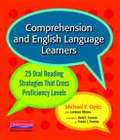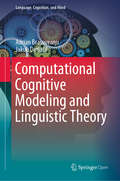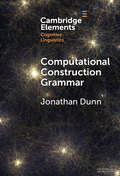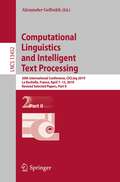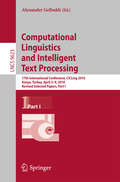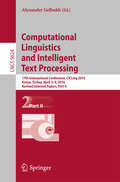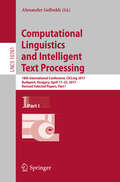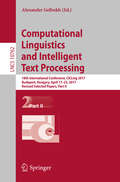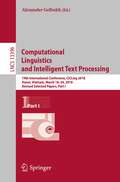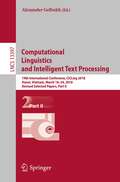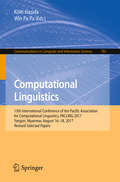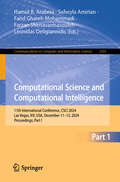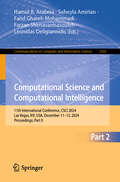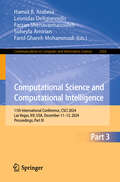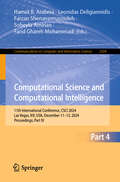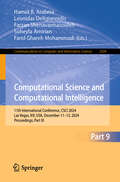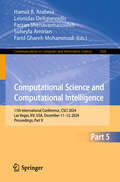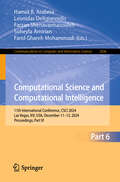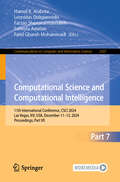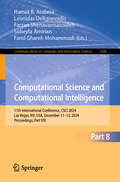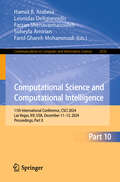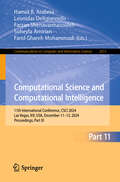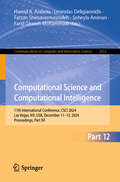- Table View
- List View
Comprehension and English Language Learners
by Michael F. Opitz Lindsey GuccioneThis book is one of the few that focuses on oral language development, a crucial but often overlooked component of academic development for ELLs. It helps fill a gap in the professional resources teachers need to help their English language learners reach high levels of oral and written English proficiency. - David and Yvonne Freeman Authors of Teaching Reading in Multilingual Classrooms and Essential Linguistics Oral reading is powerful enough to simultaneously support every student's comprehension learning and scaffold English language learners' progress toward proficiency. But not just any kind of oral reading will do. To help everyone in your class, you need effective, engaging strategies that can motivate all readers and help them learn to make meaning with texts - the kind you'll find in Comprehension and English Language Learners. The 25 oral reading strategies in Comprehension and English Language Learners support students with differing levels of English proficiency during regular reading instruction - from beginners to those completely comfortable with their new language. Michael Opitz (coauthor of Goodbye Round Robin, Updated Edition) and Lindsey Guccione help you go beyond oral reading activities such as round robin or popcorn reading that have no research base and that can actually inhibit reading progress. With their strategies, you'll instead help English language learners: develop and monitor reading and listening comprehension evaluate texts and engage with authors learn social and academic vocabulary connect writing, reading, speaking, listening, and viewing get motivated to read on their own. In addition, Opitz and Guccione make determining students' level of English proficiency easier with a primer on effective ELL assessment. They show you how each strategy can work within or across levels to help English learners make progress or consolidate gains. Each strategy is clearly presented and ready to use today with teaching suggestions, classroom examples, suggested children's literature, and online resources. Supplement your silent-reading program with oral reading that works. Read Comprehension and English Language Learners and teach with its strategies. Then listen to your English language learners to hear how powerful oral reading can be for developing comprehension.
Compromise and Resistance in Postcolonial Writing: E. M. Forster’s Legacy
by Alberto Fernández CarbajalCompromise and Resistance in Postcolonial Writing is an illuminating study of E.M. Forster, offering a new critical approach to his legacy. It examines key themes in Forster's work (homosexuality, humanism, modernism, liberalism) and their relevance to post-imperial and postcolonial novels by important contemporary writers.
Computational Cognitive Modeling and Linguistic Theory (Language, Cognition, and Mind #6)
by Adrian Brasoveanu Jakub DotlačilThis open access book introduces a general framework that allows natural language researchers to enhance existing competence theories with fully specified performance and processing components. Gradually developing increasingly complex and cognitively realistic competence-performance models, it provides running code for these models and shows how to fit them to real-time experimental data. This computational cognitive modeling approach opens up exciting new directions for research in formal semantics, and linguistics more generally, and offers new ways of (re)connecting semantics and the broader field of cognitive science.The approach of this book is novel in more ways than one. Assuming the mental architecture and procedural modalities of Anderson’s ACT-R framework, it presents fine-grained computational models of human language processing tasks which make detailed quantitative predictions that can be checked against the results of self-paced reading and other psycho-linguistic experiments. All models are presented as computer programs that readers can run on their own computer and on inputs of their choice, thereby learning to design, program and run their own models. But even for readers who won't do all that, the book will show how such detailed, quantitatively predicting modeling of linguistic processes is possible. A methodological breakthrough and a must for anyone concerned about the future of linguistics! (Hans Kamp) This book constitutes a major step forward in linguistics and psycholinguistics. It constitutes a unique synthesis of several different research traditions: computational models of psycholinguistic processes, and formal models of semantics and discourse processing. The work also introduces a sophisticated python-based software environment for modeling linguistic processes. This book has the potential to revolutionize not only formal models of linguistics, but also models of language processing more generally. (Shravan Vasishth)
Computational Construction Grammar: A Usage-Based Approach (Elements in Cognitive Linguistics)
by Jonathan DunnThis Element introduces a usage-based computational approach to Construction Grammar that draws on techniques from natural language processing and unsupervised machine learning. This work explores how to represent constructions, how to learn constructions from a corpus, and how to arrange the constructions in a grammar as a network. From a theoretical perspective, this Element examines how construction grammars emerge from usage alone as complex systems, with slot-constraints learned at the same time that constructions are learned. From a practical perspective, this work is accompanied by a Python package which enables linguists to incorporate construction grammars into their own corpus-based work. The computational experiments in this Element are important for testing the learnability, variability, and confirmability of Construction Grammar as a theory of language. All code examples will leverage the cloud computing platform Code Ocean to guide readers through implementation of these algorithms.
Computational Fluid Dynamics
by T. J. ChungIn this second edition of Computational Fluid Dynamics, the author presents up-to-date treatments of all computational methods of fluid dynamics, while maintaining the original idea of including all computational fluid dynamics methods. The breadth of information sets this book apart from its competitors and allows the instructor to adopt this book, selecting only those subject areas of his or her interest. The second edition includes a new section on preconditioning for EBE-GMRES and a complete revision of the section on flow field-dependent variation methods, which demonstrates more detailed computational processes and includes additional example problems. Homework examples facilitate students and practitioners intending to develop a large-scale computer code.
Computational Linguistics and Intelligent Text Processing: 20th International Conference, CICLing 2019, La Rochelle, France, April 7–13, 2019, Revised Selected Papers, Part II (Lecture Notes in Computer Science #13452)
by Alexander GelbukhThe two-volume set LNCS 13451 and 13452 constitutes revised selected papers from the CICLing 2019 conference which took place in La Rochelle, France, April 2019.The total of 95 papers presented in the two volumes was carefully reviewed and selected from 335 submissions. The book also contains 3 invited papers. The papers are organized in the following topical sections: General, Information extraction, Information retrieval, Language modeling, Lexical resources, Machine translation, Morphology, sintax, parsing, Name entity recognition, Semantics and text similarity, Sentiment analysis, Speech processing, Text categorization, Text generation, and Text mining.
Computational Linguistics and Intelligent Text Processing: 16th International Conference, Cicling 2015, Cairo, Egypt, April 14-20, 2015, Proceedings, Part I (Lecture Notes in Computer Science #9041)
by Alexander GelbukhThe two-volume set LNCS 9623 + 9624 constitutes revised selected papers from the CICLing 2016 conference which took place in Konya, Turkey, in April 2016. The total of 89 papers presented in the two volumes was carefully reviewed and selected from 298 submissions. The book also contains 4 invited papers and a memorial paper on Adam Kilgarriff’s Legacy to Computational Linguistics. The papers are organized in the following topical sections: Part I: In memoriam of Adam Kilgarriff; general formalisms; embeddings, language modeling, and sequence labeling; lexical resources and terminology extraction; morphology and part-of-speech tagging; syntax and chunking; named entity recognition; word sense disambiguation and anaphora resolution; semantics, discourse, and dialog. Part II: machine translation and multilingualism; sentiment analysis, opinion mining, subjectivity, and social media; text classification and categorization; information extraction; and applications.
Computational Linguistics and Intelligent Text Processing: 16th International Conference, Cicling 2015, Cairo, Egypt, April 14-20, 2015, Proceedings, Part I (Lecture Notes in Computer Science #9041)
by Alexander GelbukhThe two-volume set LNCS 9623 + 9624 constitutes revised selected papers from the CICLing 2016 conference which took place in Konya, Turkey, in April 2016. The total of 89 papers presented in the two volumes was carefully reviewed and selected from 298 submissions. The book also contains 4 invited papers and a memorial paper on Adam Kilgarriff’s Legacy to Computational Linguistics. The papers are organized in the following topical sections: Part I: In memoriam of Adam Kilgarriff; general formalisms; embeddings, language modeling, and sequence labeling; lexical resources and terminology extraction; morphology and part-of-speech tagging; syntax and chunking; named entity recognition; word sense disambiguation and anaphora resolution; semantics, discourse, and dialog. Part II: machine translation and multilingualism; sentiment analysis, opinion mining, subjectivity, and social media; text classification and categorization; information extraction; and applications.
Computational Linguistics and Intelligent Text Processing: 18th International Conference, CICLing 2017, Budapest, Hungary, April 17–23, 2017, Revised Selected Papers, Part I (Lecture Notes in Computer Science #10761)
by Alexander GelbukhThe two-volume set LNCS 10761 + 10762 constitutes revised selected papers from the CICLing 2017 conference which took place in Budapest, Hungary, in April 2017. The total of 90 papers presented in the two volumes was carefully reviewed and selected from numerous submissions. In addition, the proceedings contain 4 invited papers.The papers are organized in the following topical sections:Part I: general; morphology and text segmentation; syntax and parsing; word sense disambiguation; reference and coreference resolution; named entity recognition; semantics and text similarity; information extraction; speech recognition; applications to linguistics and the humanities. Part II: sentiment analysis; opinion mining; author profiling and authorship attribution; social network analysis; machine translation; text summarization; information retrieval and text classification; practical applications.
Computational Linguistics and Intelligent Text Processing: 18th International Conference, CICLing 2017, Budapest, Hungary, April 17–23, 2017, Revised Selected Papers, Part II (Lecture Notes in Computer Science #10762)
by Alexander GelbukhThe two-volume set LNCS 10761 + 10762 constitutes revised selected papers from the CICLing 2017 conference which took place in Budapest, Hungary, in April 2017. The total of 90 papers presented in the two volumes was carefully reviewed and selected from numerous submissions. In addition, the proceedings contain 4 invited papers.The papers are organized in the following topical sections:Part I: general; morphology and text segmentation; syntax and parsing; word sense disambiguation; reference and coreference resolution; named entity recognition; semantics and text similarity; information extraction; speech recognition; applications to linguistics and the humanities. Part II: sentiment analysis; opinion mining; author profiling and authorship attribution; social network analysis; machine translation; text summarization; information retrieval and text classification; practical applications.
Computational Linguistics and Intelligent Text Processing: 19th International Conference, CICLing 2018, Hanoi, Vietnam, March 18–24, 2018, Revised Selected Papers, Part I (Lecture Notes in Computer Science #13396)
by Alexander GelbukhThe two-volume set LNCS 13396 and 13397 constitutes revised selected papers from the CICLing 2018 conference which took place in Hanoi, Vietnam, in March 2018.The total of 68 papers presented in the two volumes was carefully reviewed and selected from 181 submissions. The focus of the conference was on following topics such as computational linguistics and intelligent text and speech processing and others. The papers are organized in the following topical sections: General, Author profiling and authorship attribution, social network analysis, Information retrieval, information extraction, Lexical resources, Machine translation, Morphology, syntax, Semantics and text similarity, Sentiment analysis, Syntax and parsing, Text categorization and clustering, Text generation, and Text mining.
Computational Linguistics and Intelligent Text Processing: 19th International Conference, CICLing 2018, Hanoi, Vietnam, March 18–24, 2018, Revised Selected Papers, Part II (Lecture Notes in Computer Science #13397)
by Alexander GelbukhThe two-volume set LNCS 13396 and 13397 constitutes revised selected papers from the CICLing 2018 conference which took place in Hanoi, Vietnam, in March 2018.The total of 68 papers presented in the two volumes was carefully reviewed and selected from 181 submissions. The focus of the conference was on following topics such as computational linguistics and intelligent text and speech processing and others. The papers are organized in the following topical sections: General, Author profiling and authorship attribution, social network analysis, Information retrieval, information extraction, Lexical resources, Machine translation, Morphology, syntax, Semantics and text similarity, Sentiment analysis, Syntax and parsing, Text categorization and clustering, Text generation, and Text mining.
Computational Linguistics: 15th International Conference Of The Pacific Association For Computational Linguistics, Pacling 2017, Yangon, Myanmar, August 16-18, 2017, Revised Selected Papers (Communications In Computer And Information Science #781)
by Kôiti Hasida Win Pa PaThis book constitutes the refereed proceedings of the 15th International Conference of the Pacific Association for Computational Linguistics, PACLING 2017, held in Yangon, Myanmar, in August 2017.The 28 revised full papers presented were carefully reviewed and selected from 50 submissions. The papers are organized in topical sections on semantics and semantic analysis; statistical machine translation; corpora and corpus-based language processing; syntax and syntactic analysis; document classification; information extraction and text mining; text summarization; text and message understanding; automatic speech recognition; spoken language and dialogue; speech pathology; speech analysis.
Computational Science and Computational Intelligence: 11th International Conference, CSCI 2024, Las Vegas, NV, USA, December 11–13, 2024, Proceedings, Part I (Communications in Computer and Information Science #2501)
by Hamid R. Arabnia Leonidas Deligiannidis Soheyla Amirian Farzan Shenavarmasouleh Farid Ghareh MohammadiThe CCIS book constitutes selected papers accepted in the Research Track on Artificial Intelligence of the 11th International Conference on Computational Science and Computational Intelligence, CSCI 2024, which took place in Las Vegas, NV, USA, during December 11–13, 2024. The 27 full papers included in this book were carefully reviewed and selected from a total of 383 submissions. They were organized in topical sections on large language models and methodologies; deep learning and applications; artificial intelligence and prediction methods; and artificial intelligence, machine learning, applications and alrogithms.
Computational Science and Computational Intelligence: 11th International Conference, CSCI 2024, Las Vegas, NV, USA, December 11–13, 2024, Proceedings, Part II (Communications in Computer and Information Science #2502)
by Hamid R. Arabnia Leonidas Deligiannidis Soheyla Amirian Farzan Shenavarmasouleh Farid Ghareh MohammadiThe CCIS book constitutes selected papers accepted in the Research Track on Artificial Intelligence of the 11th International Conference on Computational Science and Computational Intelligence, CSCI 2024, which took place in Las Vegas, NV, USA, during December 11–13, 2024. The 31 full papers included in this book were carefully reviewed and selected from a total of 383 submissions. They were organized in topical sections on prediction methods and novel applications; large language models, generative tools, speech recognition and applications; computational intelligence, machine learning, data science and applications; and artificial intelligence - ongoing research projects.
Computational Science and Computational Intelligence: 11th International Conference, CSCI 2024, Las Vegas, NV, USA, December 11–13, 2024, Proceedings, Part III (Communications in Computer and Information Science #2503)
by Hamid R. Arabnia Leonidas Deligiannidis Soheyla Amirian Farzan Shenavarmasouleh Farid Ghareh MohammadiThe CCIS book constitutes selected papers accepted in the Research Track on Artificial Intelligence of the 11th International Conference on Computational Science and Computational Intelligence, CSCI 2024, which took place in Las Vegas, NV, USA, during December 11–13, 2024. The 25 full papers included in this book were carefully reviewed and selected from a total of 383 submissions. They were organized in topical sections on machine learning, neural networks, knowledge graphs, and applications; artificial intelligence and novel applications; and computational intelligence and applications.
Computational Science and Computational Intelligence: 11th International Conference, CSCI 2024, Las Vegas, NV, USA, December 11–13, 2024, Proceedings, Part IV (Communications in Computer and Information Science #2504)
by Hamid R. Arabnia Leonidas Deligiannidis Soheyla Amirian Farzan Shenavarmasouleh Farid Ghareh MohammadiThe CCIS book constitutes selected papers accepted in the Research Track on Education of the 11th International Conference on Computational Science and Computational Intelligence, CSCI 2024, which took place in Las Vegas, NV, USA, during December 11–13, 2024. The 26 full papers included in this book were carefully reviewed and selected from a total of 155 submissions. They were organized in topical sections on subject-specific education and curriculum design; education and artificial intelligence; teaching and learning strategies and related reserach studies.
Computational Science and Computational Intelligence: 11th International Conference, CSCI 2024, Las Vegas, NV, USA, December 11–13, 2024, Proceedings, Part IX (Communications in Computer and Information Science #2509)
by Hamid R. Arabnia Leonidas Deligiannidis Soheyla Amirian Farzan Shenavarmasouleh Farid Ghareh MohammadiThis CCIS book constitutes selected papers accepted in the Research Track on Big Data and Data Science and the Research Track on Social Network Analysis, Social Media and Mining held as part of the International Conference on Computational Science and Computational Intelligence, CSCI 2024, which took place in Las Vegas, NV, USA, during December 11–13, 2024. The Research Track on Big Data and Data Science, CSCI-RTBD, received 72 submissions of which 18 papers were accepted. For the Research Track on Social Network Analysis, Social Media and Mining, CSCI-RTNA, 7 papers were accepted from 41 submissions. They were organized in topical sections on Big Data and Data Science - applications and algorithms; Social Network Analysis, Social Media, and Mining; and Ongoing Research Projects and Posters.
Computational Science and Computational Intelligence: 11th International Conference, CSCI 2024, Las Vegas, NV, USA, December 11–13, 2024, Proceedings, Part V (Communications in Computer and Information Science #2505)
by Hamid R. Arabnia Leonidas Deligiannidis Soheyla Amirian Farzan Shenavarmasouleh Farid Ghareh MohammadiThis CCIS book constitutes selected papers accepted in the Research Track on Smart Cities and Smart Mobility and the Research Track on Software Engineering of the 11th International Conference on Computational Science and Computational Intelligence, CSCI 2024, which took place in Las Vegas, NV, USA, during December 11–13, 2024. The Research Track on Smart Cities and Smart Mobility, CSCI-RTSC, received 75 submissions of which 15 papers were accepted. For the Research Track on Software Engineering, CSCI-RTSE, 13 papers were accepted from 58 submissions, 12 of these are included in this volume. They were organized in topical sections on Infrastructures: Smart Cities, Tools, and Utilities; Smart Cities and Smart Mobility; Software Engineering; and ongoing research projects.
Computational Science and Computational Intelligence: 11th International Conference, CSCI 2024, Las Vegas, NV, USA, December 11–13, 2024, Proceedings, Part VI (Communications in Computer and Information Science #2506)
by Hamid R. Arabnia Leonidas Deligiannidis Soheyla Amirian Farzan Shenavarmasouleh Farid Ghareh MohammadiThis CCIS book constitutes selected papers accepted in the Research Track on Computational Science and the Research Track on Computational Intelligence held as part of the 11th International Conference on Computational Science and Computational Intelligence, CSCI 2024, which took place in Las Vegas, NV, USA, during December 11–13, 2024. The 24 full papers included in this book were carefully reviewed and selected from a total of 78 submissions. The Research Track on Computational Science, CSCI-RTSC, received 78 submissions of which 17 papers were accepted; 16 of these are included in this volume. For the Research Track on Computational Intelligence, CSCI-RTCI, 10 papers were accepted from 59 submissions. The contributions were organized in topical sections on Computational Science - Frameworks, Applications, and Algorithms; Computational Science - Mathematics, Simulation, Performance Studies, Optimization and Programming; and Computational Intelligence - Optimization, Applications and Algorithms.
Computational Science and Computational Intelligence: 11th International Conference, CSCI 2024, Las Vegas, NV, USA, December 11–13, 2024, Proceedings, Part VII (Communications in Computer and Information Science #2507)
by Hamid R. Arabnia Leonidas Deligiannidis Soheyla Amirian Farzan Shenavarmasouleh Farid Ghareh MohammadiThis CCIS book constitutes selected papers accepted in the Research Track on Health Informatics and Medical Systems and the Research Track on Computational Biology held as part of the 11th International Conference on Computational Science and Computational Intelligence, CSCI 2024, which took place in Las Vegas, NV, USA, during December 11–13, 2024. The Research Track on Health Informatics and Medical Systems, CSCI-RTHI, received 115 submissions of which 25 papers were accepted; this volume contains 23 of those papers. For the Research Track on Computational Biology, CSCI-RTCB, 10 papers were accepted from 55 submissions; this volume contains 9 of those papers. The contributions were organized in topical sections on Health Informatics and Medical Systems and Computational Biology.
Computational Science and Computational Intelligence: 11th International Conference, CSCI 2024, Las Vegas, NV, USA, December 11–13, 2024, Proceedings, Part VIII (Communications in Computer and Information Science #2508)
by Hamid R. Arabnia Leonidas Deligiannidis Soheyla Amirian Farzan Shenavarmasouleh Farid Ghareh MohammadiThis CCIS book constitutes selected papers accepted in the Research Track on Internet of Things and Internet of Everything and the Research Track on Cloud Computing and Data Centers held as part of the 11th International Conference on Computational Science and Computational Intelligence, CSCI 2024, which took place in Las Vegas, NV, USA, during December 11–13, 2024. The Research Track on Internet of Things and Internet, CSCI-RTOT, received 110 submissions of which 22 papers were accepted; 21 of those are included in this volume. For the Research Track on Cloud Computing and Data Centers, CSCI-RTCC, 7 papers were accepted from 36 submissions; 6 of those are included in this volume. The papers were organized in topical sections on Internet of Things and Applications; Internet of Things - Cloud Computing, Edge Computing; Communication Strategies and Applications.
Computational Science and Computational Intelligence: 11th International Conference, CSCI 2024, Las Vegas, NV, USA, December 11–13, 2024, Proceedings, Part X (Communications in Computer and Information Science #2510)
by Hamid R. Arabnia Leonidas Deligiannidis Soheyla Amirian Farzan Shenavarmasouleh Farid Ghareh MohammadiThis CCIS book constitutes selected papers accepted in the Research Track on Cyber Warfare, Cyber Defense and Cyber Security and the Research Track on Mobile Computing, Wireless Networks and Security held as part of the 11th International Conference on Computational Science and Computational Intelligence, CSCI 2024, which took place in Las Vegas, NV, USA, during December 11–13, 2024. The Research Track on Cyber Warfare, Cyber Defense and Cyber Security, CSCI-RTCW, received 98 submissions of which 18 papers were accepted. For the Research Track on Mobile Computing, Wireless Networks and Security, CSCI-RTMC, 7 papers were accepted from 31 submissions. They were organized in topical sections on Cyber Warfare, Cyber Defense and Cyber Security; and Mobile Computing, Wireless Networks and Security.
Computational Science and Computational Intelligence: 11th International Conference, CSCI 2024, Las Vegas, NV, USA, December 11–13, 2024, Proceedings, Part XI (Communications in Computer and Information Science #2511)
by Hamid R. Arabnia Leonidas Deligiannidis Soheyla Amirian Farzan Shenavarmasouleh Farid Ghareh MohammadiThis CCIS book constitutes selected papers accepted in the Research Track on Signal and Image Processing, Computer Vision and Pattern Recognition, and the Research Track on Parallel and Distributed Computing held as part of the 11th International Conference on Computational Science and Computational Intelligence, CSCI 2024, which took place in Las Vegas, NV, USA, during December 11–13, 2024. The Research Track on ignal and Image Processing, Computer Vision and Pattern Recognition, CSCI-RTPD, received 108 submissions of which 21 papers were accepted. For the Research Track on Parallel and Distributed Computing, CSCI-RTPD, 7 papers were accepted from 30 submissions. They were organized in topical sections on signal and image processing, computer vision and pattern recognition; signal and image processing, and medical applications; parallel and distributed computing, HPC and applications; and ongoing research projects and posters.
Computational Science and Computational Intelligence: 11th International Conference, CSCI 2024, Las Vegas, NV, USA, December 11–13, 2024, Proceedings, Part XII (Communications in Computer and Information Science #2512)
by Hamid R. Arabnia Leonidas Deligiannidis Soheyla Amirian Farzan Shenavarmasouleh Farid Ghareh MohammadiThis CCIS book constitutes selected papers accepted in the Research Tracks on Computational Science, Computational Intelligence, and Computational Biology of the 11th International Conference on Computational Science and Computational Intelligence, CSCI 2024, which took place in Las Vegas, NV, USA, during December 11–13, 2024.The 35 full papers included in this book were carefully reviewed and selected from a total of 180 submissions. They were organized in topical sections on computational science and applications; artificial intelligence and applications; scientific computing and HPC; health informatics and computational biology; and computational science and computational intelligence.
